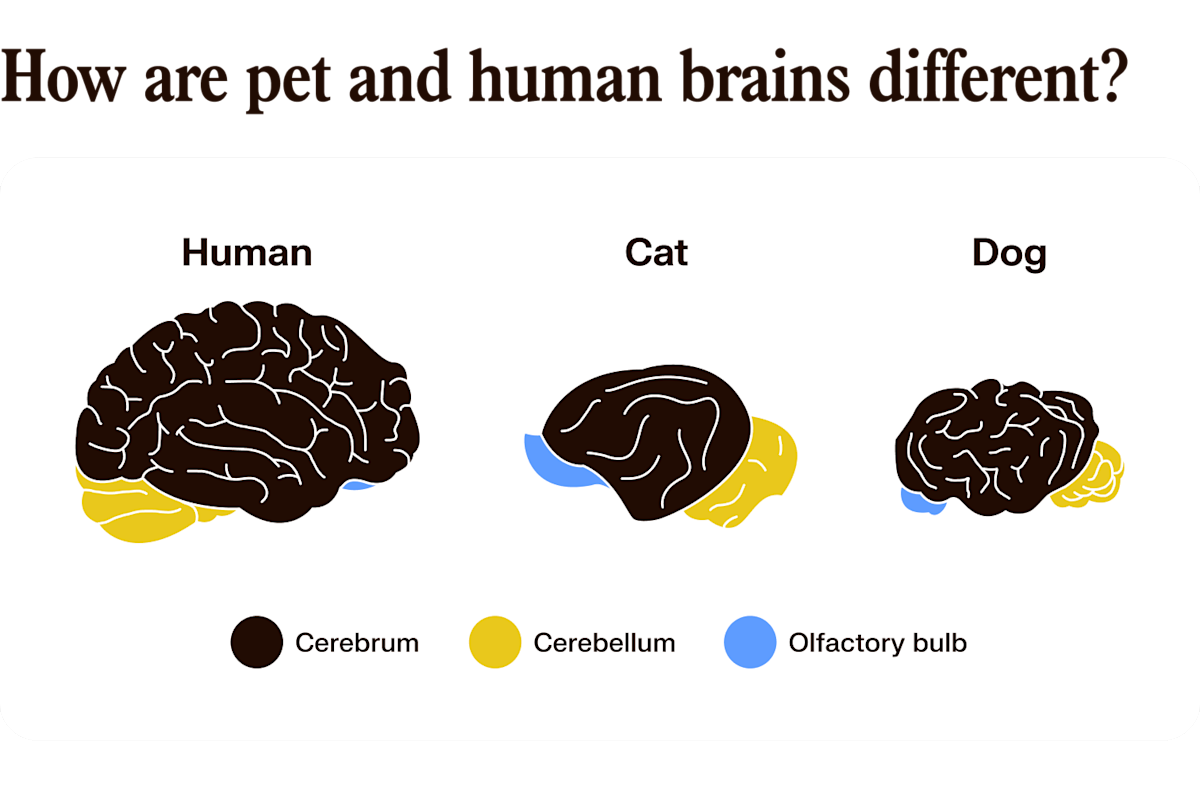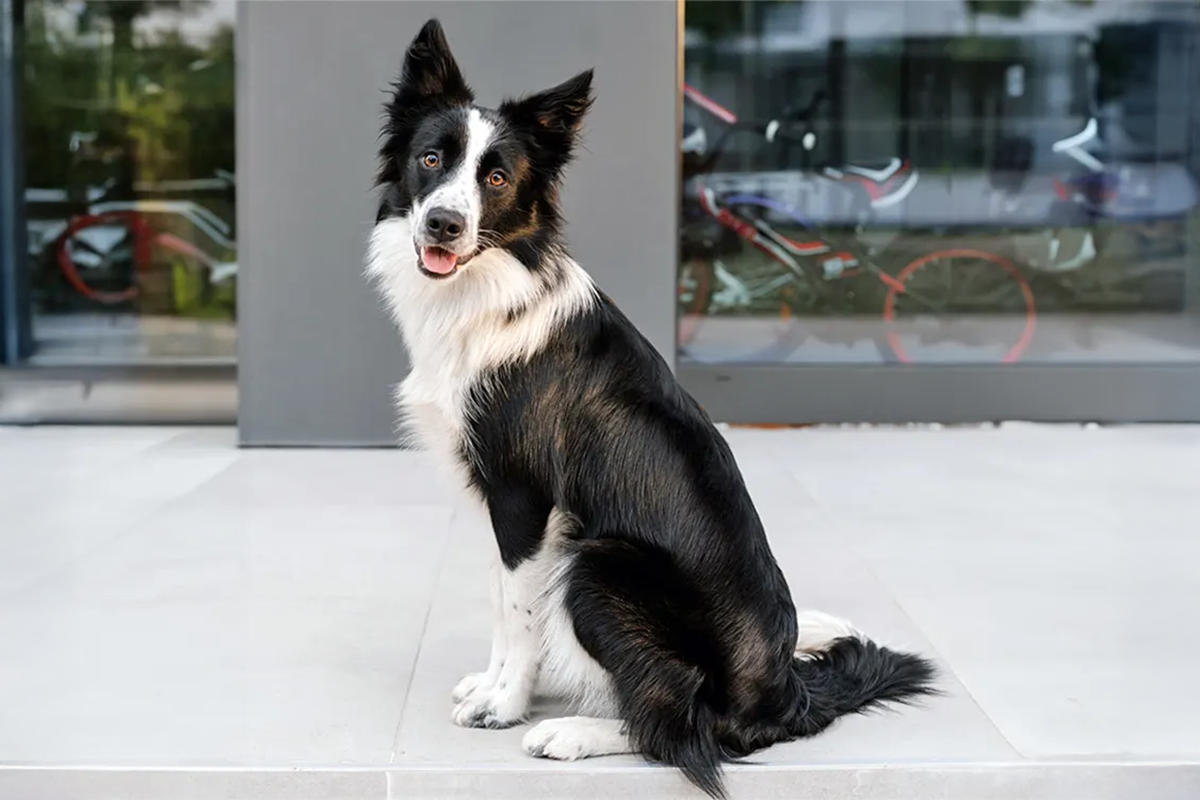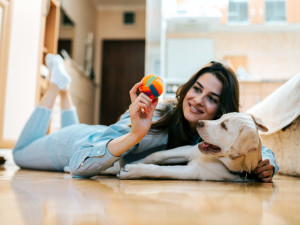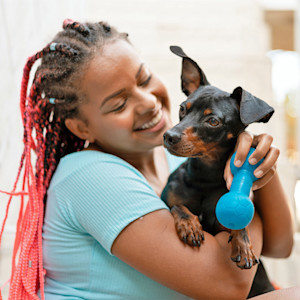How Smart are Dogs? How to Test Your Dog’s IQ
Find out.
In This Article:
Dog Brain Anatomy Dog IQ Tests What Are the Most Intelligent Breeds of Dogs? Are Dogs Smarter Than Cats? How Can You Test Your Dog’s Intelligence at Home?
Would you like to know how smart dogs areopens in new tab? Or maybe you’d like to know just how smart your own dog is? It has been proven that dogs can be highly intelligent animals, particularly in areas of social cognition and cooperative problem-solving.
Humans have bred dogs for those traits by enhancing their trainability, memory, and responsiveness to human cues. While not all breeds excel in the same areas, many dogs demonstrate remarkable understanding of gestures, commands, and even abstract reasoning. Read on to learn how veterinarians and scientists have arrived at how to measure intelligence in dogs and how you can do some testing of your own.
Save on the litter with color-changing tech that helps you better care for your cat.
How big is a dog’s brain?
A dog’s brain is roughly the size of a tangerine, which is about 1/125th of their body weight. When compared to the human brain, the estimates are not significantly different. A human brain is about 1/40th the size of its body weight. However, size alone doesn’t dictate intelligence. Let’s take a look at a dog’s brain anatomy to find out what really matters.
Brain anatomy
The dog brain, like the human brain, consists of the cerebrum, cerebellum, and brainstem. The cerebral cortex is responsible for thinking, decision-making, and problem-solving, and is the area where most cognitive processes occur. The differences between cortical neurons in dogs, cats, and humans are fairly distinct. Dogs have about 530 million cortical neurons, compared to cats (250 million) and humans (over 16 billion).
Q: Does a bigger brain mean a smarter dog?
A: No. Brain-to-body ratio and neural density matter more than sheer size.
Q: Which part of the dog’s brain is most active during learning?
A: The cerebral cortex, particularly the frontal lobe, is involved in learning and decision-making.
What is the IQ of a dog?
Although there is no specific IQ test for dogs, researchers have developed several reliable frameworks and tasks to assess canine intelligence. Here are a few:
Coren’s intelligence criteria
Psychologist Stanley Coren proposed three types of dog intelligence:
Instinctive: What the dog was bred to do (e.g., herding, guarding).
Adaptive: Problem-solving and learning from the environment.
Working and obedience: How well a dog learns to obey and carries out tasks.
Coren’s work showed that Border Collies, Poodles, and German Shepherds ranked highest in working and obedience intelligence.
The canine cognitive battery
Developed by Dr. Brian Hare at Duke University’s Canine Cognition Center, this suite of tests evaluates:
Memory: Can the dog remember where a treat is hidden?
Gesture understanding: Can the dog follow a human’s gaze or pointing finger?
Reasoning: Can the dog make assumptions from limited data?
Social intelligence: How does the dog read human emotion and body language?
Object permanence tests
These are used to evaluate if a dog understands that an object still exists even if it’s hidden. Puppies begin to develop this skill around eight weeks of age. A simple home test involves hiding a treat under one cup and observing if the dog can track it.
Problem-solving tests
Problem-solving tests, such as detour tests, challenge dogs to figure out how to reach a treat placed behind a barrier. Dogs must figure out that they need to walk around instead of going straight.
The Volhard Puppy Aptitude Test
Used by breeders and trainers, this test evaluates:
Social attraction
Following behavior
Restraint tolerance
Problem-solving ability
Confidence level
The AKC Canine Good Citizen Test
This test focuses on a dog’s manners, trainability, and response to commands in real-world situations. While it doesn’t assess intelligence in the abstract, it strongly correlates with working intelligence.
Q: Can I test my dog’s IQ at home?
A: Yes, simple object permanence and problem-solving games with cups and hidden treats can provide valuable insights.
Q: Do IQ levels vary between puppies and adult dogs?
A: Yes. Puppies are still developing cognitive skills, while adults have more refined reasoning and memory.
What are the most intelligent breeds of dogs?
Not all dogs learn the same way. Intelligence varies across breeds based on their intended purpose. Some excel in obedience, others in independence, or spatial tasks. The following two breeds are examples of dogs considered highly intelligent. However, all breeds have their own type of intelligence.
1. Border Collie
Why: They are known for consistently getting top intelligence rankings. They excel at rapid learning and possess excellent memory. They’re capable of learning hundreds of words and thrive on mental stimulation.
2. Poodle
Why: Poodles excel in obedience and trick training. Their intelligence, paired with a calm temperament, makes them highly sought after in therapy and service work. They are highly trainable and eager to please.
Are dogs smarter than cats?
Comparing dog and cat intelligence is similar to comparing apples and oranges. Dogs and cats have evolved to excel in very different environments and tasks.
Dogs are pack animals. They have been trained to cooperate with humans and with each other. Their intelligence is largely social, involving understanding human gestures, learning commands, and solving problems collaboratively.
Cats, on the other hand, are solitary hunters. While some people think cats aren’t affectionate or social, that’s not true. Their intelligence, however, centers around stealth, independence, and spatial memory. They excel at observational learning and subtle problem-solving but are less inclined to follow human instruction. However, being independent doesn’t mean they’re not affectionate or intelligent. They’re just different.
Q: Are dogs really smarter than cats?
A: Not necessarily. Dogs tend to score higher on social and working intelligence, but cats may outperform in observational and independent problem-solving tasks. They’re just different from each other.
Q: Which has more neurons — dogs or cats?
A: Dogs. Studies show dogs have about twice as many cortical neurons as cats, suggesting greater potential for complex tasks.
Bottom line
While we would prefer a very precise IQ test for our dogs, the best we can do is administer a series of tests that assess various skills. These tests are very helpful in determining whether a dog is intelligent or not. The general results indicate that dogs are undeniably intelligent creatures, especially in their interactions with humans.
Some dogs excel in obedience, while others are superior in reasoning or social communication. Regardless of what area your dog excels in, it’s helpful for your bond and training to understand how your pup learns.
Want to test your dog’s smarts?
Try a few of the following at home:
Hide a treat under a towel: See how long it takes your dog to uncover it.
Point to one of two cups: Can your dog follow your gaze or gesture?
Place a treat behind a clear barrier: Does your dog go around it or try to go through it?
Just like people, different dogs shine in different areas. And that uniqueness is what makes them all brilliant in their own way.
References
Arden, Rosalind, and Mark James Adams. “A General Intelligence Factor in Dogs.” opens in new tabIntelligence, vol. 55, Mar. 2016, pp. 79–85,
Gnanadesikan, Gitanjali E, et al. “Breed Differences in Dog Cognition Associated with Brain-Expressed Genes and Neurological Functions.” opens in new tabIntegrative and Comparative Biology, vol. 60, no. 4, 29 July 2020, pp. 976–990, academic.oup.com/icb/article/60/4/976/5877945?login=true, Accessed 21 July 2021.
Howell, Tiffani Josey, et al. “The Perceptions of Dog Intelligence and Cognitive Skills (PoDIaCS) Survey.”opens in new tab Journal of Veterinary Behavior, vol. 8, no. 6, Nov. 2013, pp. 418–424











